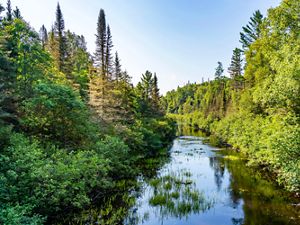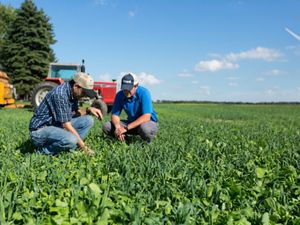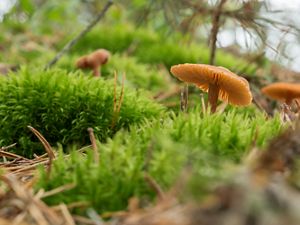
Policy Priorities in Michigan
The Nature Conservancy (TNC) is working with state leaders to find meaningful solutions to issues impacting Michigan’s lands and waters.
Explore our latest policy objectives in the Great Lakes State.
From our state director
Our Priorities
We have years, not decades to take on the interconnected crises of climate change and biodiversity loss. At The Nature Conservancy (TNC), we have set ambitious 2030 Goals that research tells us can slow the interconnected crises of climate change and biodiversity loss. And thanks to our science-based, pragmatic approach and a long history of fostering relationships, we know how to bring on the people, partnerships and tools needed to be successful.
From the timber, farmlands and fisheries that help power the Great Lakes economy; to the forests that keep our air and water clean; to the wetlands that protect our coasts from floods and erosion—nature offers critical solutions to help Michigan find resilience in a time of change.
That’s why TNC works with leaders across Michigan and the Midwest to advance nature-based solutions that benefit Great Lakes communities, lands, waters and wildlife. We also demonstrate the impact and scalability of investment in nature-based solutions through active conservation projects—for example, supporting sustainable timber in the Upper Peninsula and helping to transform agricultural supply chains in the Saginaw Bay watershed.
From our advocacy efforts to our projects in the field, TNC’s work is defined by a collaborative approach that has been shaped by decades of learning. Our local expertise and global resources enable us to play a special role working side-by-side with partners, communities and decision-makers across Michigan—and we hope to continue that collaborative tradition with you.
In short, nature offers us a powerful set of tools—tools we can all get behind to support Michigan communities for many years to come. When we work together with nature, everyone wins. Together we find a way.
Helen Taylor
State Director, Michigan
Protect Michigan’s Lands & Biodiversity
In a changing world, the concerns of nature are inseparable from the concerns of people. Growing threats to biodiversity, water quality and food supplies, a changing climate and other challenges make it increasingly clear that healthy natural systems are vital to our future, and the future of Michigan.
Tackle Carbon Emissions
Science tells us we must reach net-zero carbon emissions by 2050 to combat the worst impacts of climate change. This will require a rapid transition away from fossil fuels and toward renewable sources such as wind and solar energy. It will also require tapping into nature’s solutions to climate change.
To help achieve that, TNC is providing innovative strategies and tools grounded in leading science, partnerships, public policy and market-based approaches to accelerate the Midwest’s contribution to a net-zero emissions future, while avoiding land-use conflicts and potential harm to communities and wildlife.
What we're doing: TNC’s conservation-informed tools, including Site Renewables Right and Power of Place, help renewable energy developers select sites for utility-scale wind and solar installations that avoid detrimental impacts to nature and communities.

Build Climate Resilience
Nature is our ally in abating the negative impacts of greenhouse gas emissions. However, changing climatic conditions and habitat loss threaten to undermine the many benefits that healthy, resilient lands and waters provide, including carbon sequestration and sustainable economies.
Through conservation, restoration and improved land management, TNC strives to help Michigan build environmental resilience and protect biodiversity, so that nature can help our communities thrive in a changing climate.
What we're doing: TNC’s “Resilient and Connected Lands” tool provides a roadmap of U.S. lands with the unique topographies, geologies and other characteristics that can help plants and animals adapt to climate impacts.
Practical Climate Sustainability
TNC and the Michigan Manufacturers Association are following up on the success of our first series of practical climate sustainability seminars for Michigan businesses, with a second series planned in 2023.
Restore Native Forests
Spanning over 60 million acres, the Northwoods are a dense blanket of green that covers the northern parts of Minnesota, Wisconsin and Michigan. The diversity, climate resilience and pest resilience of these forests depend on their restoration and sustainable management, which also benefits state economies.
On our working forest reserves in Michigan, TNC demonstrates the sustainable management practices necessary to keep Michigan forests healthy. We also work to strengthen incentives and opportunities for others to implement these practices, and to help forests sequester and store more carbon.
What we're doing: In 2023, TNC expanded the Family Forest Carbon Program to cover 12 states and more Michigan counties. The program, a partnership with the American Forest Federation, makes carbon market incentives for sustainable forestry practices accessible for landowners with as few as 30 acres.
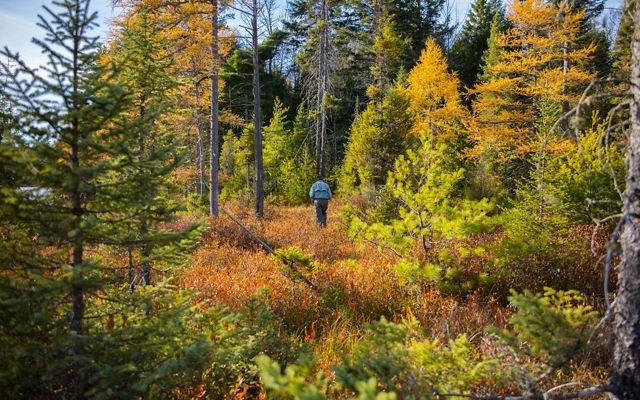
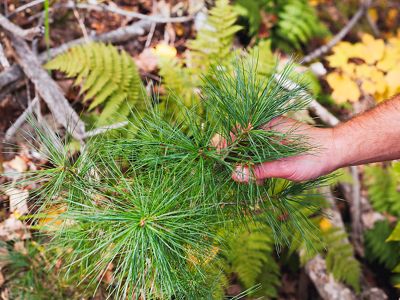

Latest News in Michigan
Sign up to receive monthly conservation news and updates from Michigan. Get a preview of Michigan’s Nature News email.
Sustain Great Lakes Food & Fresh Water
Here in Michigan, we live at the heart of one of the world’s greatest freshwater regions. The thoughtful stewardship of waters ensures they can continue to support an abundance of wildlife and provide vital services to people, from nature-based economies, to clean water, to the food systems we depend on.
Search for Lake Whitefish
Fisheries experts are taking to Michigan rivers in search of this important species.
Learn MoreSafeguard Great Lakes Fisheries
Michigan boasts the longest shoreline of any Great Lakes state—the longest freshwater shoreline in the world. Our connection to the Great Lakes is strong, and our good stewardship is vital to this globally significant resource.
TNC works tirelessly to understand the threats facing Great Lakes ecosystems, and to pursue restoration solutions that protect native fish species and their roles in thriving coastal communities. We align our efforts with partners across the Great Lakes—preventing invasive species from taking hold, protecting coastal systems against degradation and more.
What we're doing: While iconic native species such as lake whitefish still swim in Great Lakes waters, their numbers are dwindling. TNC is working with state and Tribal partners to research the causes and develop solutions.

Sustainable Conservation Funding
Our conservation and climate work is not possible without consistent, robust funding from Congress. TNC continues to share our science and expertise on key topics, such as:
- Recovering America’s Wildlife Act (RAWA) and its long-term potential to benefit state economies and biodiversity.
- U.S. Foundation for International Conservation Act that would fund public-private partnerships to support international communityled conservation and its economic and security benefits.
What we're doing: When TNC acquired 32,000 acres in the Keweenaw Peninsula, we saw an opportunity to partner with the community and the Michigan Department of Natural Resources to ensure long-term environmental and economic benefits. TNC is working to secure $30M in public funding for the sustainable management of the lands in perpetuity.

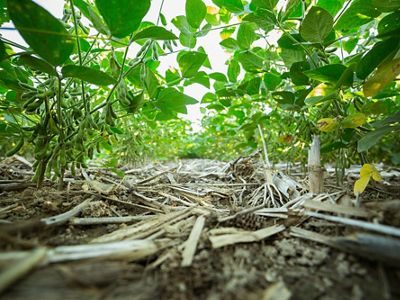
Promote Regenerative Agricultural Practices
Farmers are stewards of the productive soils that provide food for the world. By protecting the health of these soils, Michigan farmers not only contribute to long-term farm productivity, but also protect rivers, streams and lakes from harmful nutrient runoff and erosion, and improve soil carbon retention.
For more than a decade, TNC has been partnering with Saginaw Bay watershed farmers to expand the use of soil health practices such as cover crops, no-till and precision nutrient application methods. This includes offering incentives programs, learning opportunities and more.
What we're doing: TNC supports several farmer-led watershed groups in the Saginaw Bay area. These self-governed groups highlight the growing leadership of regional farmers in addressing local water quality and soil health issues.
Contact Us
Meet our policy and government relations team in Michigan.



